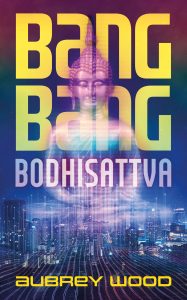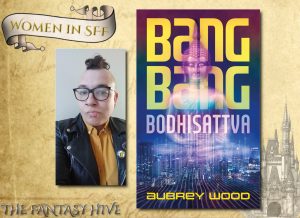Interview with Aubrey Wood (BANG BANG BODHISATTVA)
Aubrey Wood was born in California to a mixed-race couple and spent much of her childhood jumping back and forth between there and New Zealand until finally being trapped in a rural New Zealand hamlet at the age of 10. She has since spent most of her life in Auckland and on the internet. As a child Aubrey made picture books, as a teenager she furiously churned out fanfiction, and started trying to write professionally in 2011 after a brief and unsuccessful bid to become Trent Reznor. Bang Bang Bodhisattva is her debut novel.
Welcome to the Hive, Aubrey. Let’s start with the basics: tell us about Bang Bang Bodhisattva – why should readers check it out?
Bang Bang Bodhisattva is a queer-cyberpunk-noir-buddy-comedy-murder-mystery about a cringefail trans girl hacker, a Humphrey Bogart cosplayer, and the friends they make along the way. You will either completely love it or you will feverishly hate it.
Your debut novel is a cyberpunk story. What makes the genre relevant today, particularly in terms of your trans woman protagonist?
Cyberpunk, with its extreme body modification and cyberspace avatars, has been a genre that plays with the idea of gender nonconformity since as far back as Gibson’s Johnny Mnemonic, up to and including the questionable handling of gender diversity in CD Projekt Red’s Cyberpunk 2077. Unfortunately, barring outliers, these themes have usually been relegated to background characters–providing cyberpunk’s futuristic “flavor” but not allowed the sympathy of telling their stories–or allegory, such as in the case of The Matrix. Bang Bang is, from the first page, openly and unapologetically transgender. Its queerness is inextricable from its plot at a time when books with queer content are being banned from libraries. I feel like it’s time for a queer cyberpunk revival–we live in a real world that is so saturated with lessons unlearned from the likes of Neuromancer and Snow Crash that it’s time to reinterrogate the themes and aesthetics of cyberpunk.
Give us an insight into your characters, who can we expect to meet? Do you have a favourite child?
Bitter Karella of The Midnight Pals praised Bang Bang for its “classic cast of hackers, gutter punks, freaks and sleazes”. On its face this struck me as strong language–many of the book’s characters, i.e. i.e. polyamorous, genderweird, sex workers, recovering drug addicts, simply resemble people I’m friends with. They’re also who I think of as my audience. However I’ve already had people bounce off the book for its strong content, and the supposedly unsavory behavior of its central characters. It escapes me sometimes what a lot of people consider normal and tolerable, and are capable of finding sympathetic. So Karella’s assessment is on the money, I think–Kiera and her friends are a bunch of degenerates, and it’s that way on purpose.
I had fun writing pretty much everybody, but–minor spoiler–in particular Miette the android got saved from the garbage compactor because I cottoned to her so much, and got upgraded to a central role in the sequel.
Your novel plays with a lot of noir tropes, especially with the character of Angel Herrera. What attracted you to the genre?
Noir and good cyberpunk are inexorable. “It was hot, the night we burned Chrome. Out in the malls and plazas, moths were batting themselves to death against the neon.” When we think of Blade Runner’s steam-choked noodle stand, Harrison Ford stooped in the swooping lines of his trenchcoat (the aesthetic of which I gleefully stole), we have to acknowledge the influences of the private detective story. It happened that I already loved film noir and the pulp mystery, the seeds of which were probably first planted deepest by the Citizen Kane-stained art deco sprawls of Batman: The Animated Series when I was little. As I got older I was drawn to the sparse and gritty prose of Raymond Chandler; while I did research for Bang Bang I fell in love with Casablanca, Sunset Boulevard, Chinatown, The Maltese Falcon. Noir captivates me with its morally gray protagonists, its harsh realities and especially its frequently Pyrrhic endings.
The novel is very much about finding family in a dystopian world. Do the people around you give you hope when the world doesn’t?
What else is there? We can’t shut our eyes to hate and ignorance. We can’t pretend it isn’t happening; to do so would be irresponsible. In spite of it all we must love, and love powerfully and without remorse.

If you were transported into your own fictional world, how do you think you would fare?
Short answer: badly.
Long answer: Bang Bang’s world is an extrapolation of the one we’re already in. In the four years since drafting it, some things in the real world have outpaced even my wryly pessimistic attempts at a joke about where we were heading. Perhaps some features of my dystopian 2032 would be preferable to right now. In Bang Bang 2032 you’ll still be able to stream The Maltese Falcon, so presumably all this horseshit with Warner Bros. didn’t happen. Is that worth living with the Patriot Points system?
We see such varying opinions from authors when it comes to the time of editing their books. How have you found the editing process? Enjoyable, stressful or satisfying?
Editing with my agent Stacia and Jim over at Rebellion was as smooth as can be. There was only one scene cut that I considered throwing a little baby tantrum about. Honestly I’m incredibly fortunate that they let me release a book into Barnes & Noble where the first page reads “Fuck the police”. I was never asked to compromise on my vision for the book.
Just for fun, how would you pitch your book as a 1-star review?
Worse than Ready Player One.
Can you tell us anything about any upcoming projects? Or can you tell us a few teasers for your sequel?
My agent is currently looking at a standalone book in the same setting which I pitched to her as “lesbian cyberpunk No Country for Old Men”. A big biker dyke bodyguard with military tech in her brain has to escort a Chinese actress marked for death across the continental US to get to a flight out of the country. In place of Anton Chigurh there’s a kind of dope-snorting Terminator who loves the Doobie Brothers. I’m currently working on a pitch for the Bang Bang sequel.
Who are the most significant women in SFF who have shaped and influenced your work?
Three of my big books are Parable of the Talents by Octavia Butler (Sower is the famous one but Talents is the one that really blows my brains out), The Left hand of Darkness by Ursula LeGuin and Ammonite by Nicola Griffith. Pat Cadigan, as the only woman in the pantheon of the classic cyberpunk movement, is inextricable from my work. Trouble and Her Friends by Melissa Scott is something of an overlooked cyberpunk classic–a “your rapper’s favorite rapper” pick, as a friend of mine deftly put it–which injects the genre with a much-needed breath of overt queerness.
Who is a great woman in SFF who we should be reading? Any hidden gems?
I really like Kameron Hurley. Read The Light Brigade.
Finally, what is the one thing you hope readers take away from your writing?
Maya Deane of Wrath Goddess Sing wrote about my book, “the doors of the future have closed, but we’re still here, irrepressible and sad and funny and drunk on love”. I’m disappointed this hasn’t been in any of the promotional material because I think that really gets to the heart of it. Bang Bang Bodhisattva sells itself on being funny, and we laugh because sometimes it’s all we can do.
Thank you so much for joining us for Women in SFF!
Thank you for having me 🙂
Bang Bang Bodhisattva is available now from Solaris Books. You can order your copy from Bookshop.org

{PinterestId: 190777}
